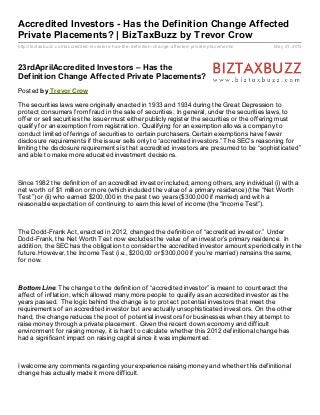
Accredited Investors – Has the Definition Change Affected Private Placements?
- 1. http://biztaxbuzz.com/accredited-investors-has-the-definition-change-affected-private-placements/ May 21, 2013 Accredited Investors - Has the Definition Change Affected Private Placements? | BizTaxBuzz by Trevor Crow 23rdAprilAccredited Investors – Has the Definition Change Affected Private Placements? Posted by Trevor Crow The securities laws were originally enacted in 1933 and 1934 during the Great Depression to protect consumers from fraud in the sale of securities. In general, under the securities laws, to offer or sell securities the issuer must either publicly register the securities or the offering must qualify for an exemption from registration. Qualifying for an exemption allows a company to conduct limited offerings of securities to certain purchasers. Certain exemptions have fewer disclosure requirements if the issuer sells only to “accredited investors.” The SEC’s reasoning for limiting the disclosure requirements is that accredited investors are presumed to be “sophisticated” and able to make more educated investment decisions. Since 1982 the definition of an accredited investor included, among others, any individual (i) with a net worth of $1 million or more (which included the value of a primary residence) (the “Net Worth Test”) or (ii) who earned $200,000 in the past two years ($300,000 if married) and with a reasonable expectation of continuing to earn this level of income (the “Income Test”). The Dodd-Frank Act, enacted in 2012, changed the definition of “accredited investor.” Under Dodd-Frank, the Net Worth Test now excludes the value of an investor’s primary residence. In addition, the SEC has the obligation to consider the accredited investor amounts periodically in the future. However, the Income Test (i.e., $200,00 or $300,000 if you’re married) remains the same, for now. Bottom Line: The change to the definition of “accredited investor” is meant to counteract the affect of inflation, which allowed many more people to qualify as an accredited investor as the years passed. The logic behind the change is to protect potential investors that meet the requirements of an accredited investor but are actually unsophisticated investors. On the other hand, the change reduces the pool of potential investors for businesses when they attempt to raise money through a private placement. Given the recent down economy and difficult environment for raising money, it is hard to calculate whether this 2012 definitional change has had a significant impact on raising capital since it was implemented. I welcome any comments regarding your experience raising money and whether this definitional change has actually made it more difficult.
